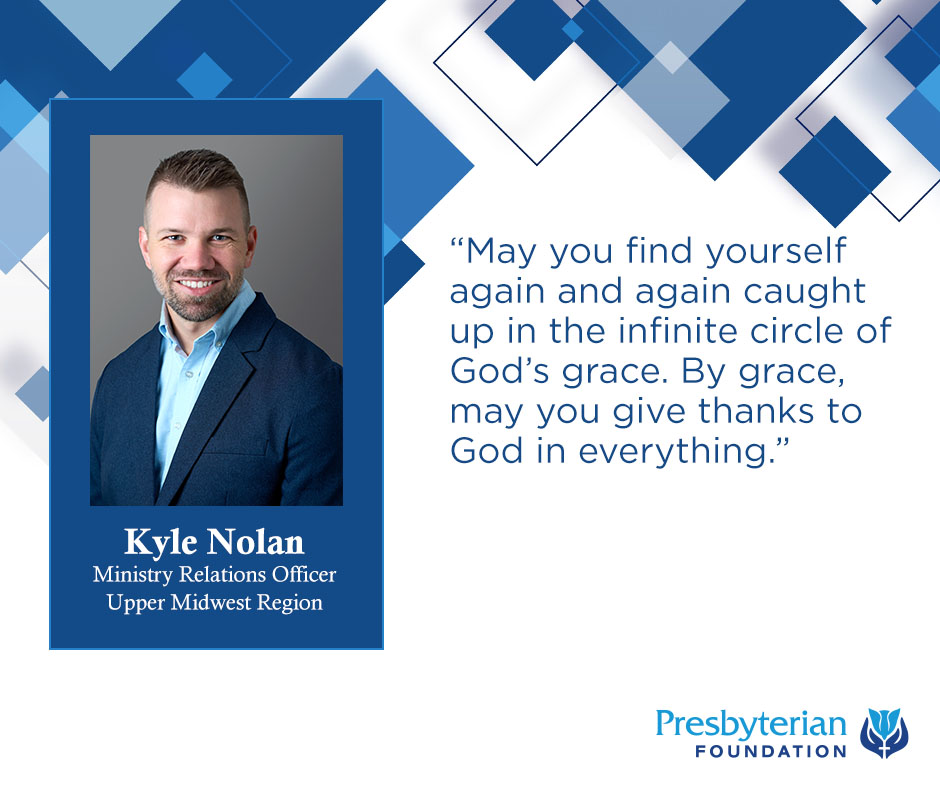10/18/2023
Stewardship Reflection: No Debts, Except to Love
by Rev. Kyle Nolan

If you were to ask most congregants in mainline churches to name the most awkward moment in public worship, I imagine the passing of the peace would be number one on the list. I haven’t polled anyone; that’s just a guess.
If you asked preachers the same question, I’d guess that many of them would say it’s the greeting line at the end of the service. While I’ve never been a senior or solo pastor, I’ve stood at the back of the sanctuary as the congregation exits just enough times to know how awkward the preacher-parishioner interaction can be. Usually, there’s at least one person who shares what they found most meaningful about the sermon who leaves me wondering what I could have said that prompted that interpretation. I’ve had people comment on my cadence or my volume. Sometimes someone will let me know that they noticed that little nervous twitch I have where I twist my wedding ring (which does wonders to calm my nerves, by the way).
For my part, the most common and consistently clumsy exchange occurs when someone simply says “thank you.” Just “Thank you.” Which, of course, is a completely appropriate and even kind thing to say to someone who’s expended a reasonable amount of effort on preaching a sermon. It’s not so much the expression of gratitude that gets me as it is my lack of an appropriate response. The customary “you’re welcome,” just doesn’t seem to fit, though it’s usually the phrase I find tumbling from my lips. Saying “thank you” in reply seems even worse, an obvious and impolite evasion.
Incidentally, my most memorable exchange during that awkward interval following worship didn’t occur on a Sunday when I preached or even in a Presbyterian congregation. Several years ago, I was visiting my wife’s Orthodox Church when I crossed paths with the parish priest, Father John. For what might be obvious reasons, he and I rarely saw eye to eye theologically. But something in his homily that morning had struck a chord with me and I wanted to let him know. So, against my better instincts, I approached him and said the words that had so often made me squirm uncomfortably in my Geneva gown.
“Thank you, Father John, for your homily. I really appreciated it.”
Then Father John smiled. And without a hint of pretense or feigned sanctity, he replied:
“Thank God.”
I can imagine several reasons those words would cross my mind if I were in his shoes. “Thank God someone made sense of something I said up there,” for instance, or “Thank God he didn’t notice that I lost a whole page of the sermon.” But that wasn’t what he meant.
To be clear, this wasn’t a less awkward response than other available options. He rebuffed my compliment, risking an uncomfortable interaction. But he dared to lean into the discomfort, to invite me to consider that whatever in his homily might have resonated, whatever connected our souls and transcended the sometimes wide gap between our traditions was ultimately a gift from above. Many of us believe this in theory. Fewer would spoil a polite interaction by naming it.

In Gratitude: An Intellectual History, Peter Leithart argues that Jesus and Paul transformed the meaning of gratitude from a sometimes-suffocating obligation into a liberating practice. Ancient societies thought of gifts and gratitude in circular terms, activated by patrons and clients. While we often think of gratitude as a simple “thank you,” ancients thought in terms of material obligations—favors and gifts owed in return for those received. You can see how this sort of system might rather quickly become oppressive for those without the means to complete the circle.
According to Leithart, Jesus and Paul transformed Roman social practice (and Western Civilization) by introducing an element of “holy ingratitude,” and by expanding the circle infinitely:
Jesus proclaimed a kingdom where debts are all forgiven, including debts of gratitude, and Paul followed Jesus in teaching that Christians owe no one anything…With Jesus and Paul, the line of the unrequited gift…is circumscribed by a circle with an infinite diameter…The circle is infinite because God is the source of every gift, even gifts mediated through human beings. Thanks is due, but it is due to the ultimate Giver…The infinite circle of Christian reciprocity opened up a space of freedom for both givers and recipients, for givers to give without strings but yet with hope of return, for recipients to receive without incurring obligations to repay. Paul is quite strict: to live as a Christian is to live without debts, including especially without debts of gratitude. Christian givers impose no debts; Christian recipients acknowledge no debts, except to love.
What I find most helpful about this framing, about the “infinite circle,” is that we’re all caught up in it together. Beyond just freeing us from one another by extracting us from the burden of transactional relationships, the infinite circle frees us for one another. If we take it seriously, we can learn to see ourselves and each other not as sources of resources or services yet to be rendered but as gifts freely and always already given. And we can learn to give thanks to God in everything.
So, to pastors and leaders and to whomever else it may concern: As we journey through yet another stewardship season, with thoughts of pledges and budgets and, yes, potential shortfalls on our minds — let alone all the pressures of ministry that weigh heavy throughout the year — may you remember that it’s not all up to you. Not even close. May you find yourself again and again caught up in the infinite circle of God’s grace. By grace, may you give thanks to God in everything. And, secure in the knowledge of the One who is the source of all good gifts, may you acknowledge no debts—no debts, except to love.

